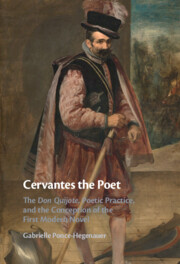 Cervantes the Poet
Cervantes the Poet Book contents
- Cervantes the Poet
- Cervantes the Poet
- Copyright page
- Dedication
- Contents
- Figures
- Acknowledgments
- Note on Abbreviations, Translations, and Terms
- Introduction The Unknown History of the Conception of the Don Quijote
- Chapter 1 Mimesis in the Court of Gentlewomen: The Pastoral Fabric of Everyday Life
- Chapter 2 Exalted Apostrophes: Cervantes in the Court of Isabel de Valois
- Chapter 3 Figura of the Poet: Pastoral Petrarchism as the Practice of Ingenious Gentlemen
- Chapter 4 The Form of Beauty: Lyric Lovers in the Mediterranean World
- Chapter 5 The Poet as Literary Character: Eclogues and Encomia in Madrid
- Chapter 6 The Literary Character as Poet: Lyric Subjectivity, Chronotopic Dynamism, and Plot in the Galatea
- Coda Alonso Quijano’s Lyric Subjectivity:
- Index
Chapter 5 - The Poet as Literary Character: Eclogues and Encomia in Madrid
Published online by Cambridge University Press: 11 May 2023
- Cervantes the Poet
- Cervantes the Poet
- Copyright page
- Dedication
- Contents
- Figures
- Acknowledgments
- Note on Abbreviations, Translations, and Terms
- Introduction The Unknown History of the Conception of the Don Quijote
- Chapter 1 Mimesis in the Court of Gentlewomen: The Pastoral Fabric of Everyday Life
- Chapter 2 Exalted Apostrophes: Cervantes in the Court of Isabel de Valois
- Chapter 3 Figura of the Poet: Pastoral Petrarchism as the Practice of Ingenious Gentlemen
- Chapter 4 The Form of Beauty: Lyric Lovers in the Mediterranean World
- Chapter 5 The Poet as Literary Character: Eclogues and Encomia in Madrid
- Chapter 6 The Literary Character as Poet: Lyric Subjectivity, Chronotopic Dynamism, and Plot in the Galatea
- Coda Alonso Quijano’s Lyric Subjectivity:
- Index
Summary
Chapter 5 reconstructs the site of production for Cervantes’ prosimetric pastoral, the Galatea (1585), and investigates the way in which he disguised himself and members of his own literary milieu as shepherd-poets under pastoral pseudonyms. It employs paratextual sources to reconstruct this milieu. Drawing on early manuscript annotations (ms.2.856, Biblioteca Nacional, Madrid) that identify Cervantes as the “Lauso” of the Galatea and earlier scholarship on the Galatea as roman à clef, this chapter proposes an additional decoding of the work through attention to the use of biographical names (and pseudonyms) for poets associated with the river Tajo in the “Canto de Calíope” (Book VI of the Galatea). With the decline of literary circles in the courts, poetic life migrated from the Alcázar to the barrio de las letras. The established poets of Isabel’s reign – Figueroa, Laínez, Gálvez de Montalvo, Gómez de Tapia, and Cervantes – were joined by younger poets – López Maldonado, Pedro de Padilla, Vargas Manrique, Liñán de Riaza, Juan Rufo Gutiérrez, Lope de Vega, Luis de Góngora – to form a milieu of “urban pastoralists.” The encomiastic poetry that Cervantes wrote indicates a network of authors contemporary to the Galatea, in which the figura of the poet became a literary character.
Keywords
- Type
- Chapter
- Information
- Cervantes the PoetThe <i>Don Quijote</i>, Poetic Practice, and the Conception of the First Modern Novel, pp. 159 - 197Publisher: Cambridge University PressPrint publication year: 2023


